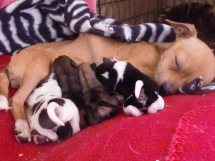In the wake of the recent destruction of 100 sled dogs in Whistler, it’s natural to reflect on what could have been done to prevent this horrific event.
Political voices from the sled dog community to animal welfare advocates say that we need better laws to protect animals (which we do) and that we need the sled dog industry to be responsible and take care of their own.
The man who shot those dogs claimed he had no other choice and that he asked for help from various agencies, and was a victim himself of a company that put profits first.
Of course this does not justify his actions or that of his company.
But the lesson I learned from this mass murder is that animal welfare has always been and will always be is a matter of diligence and cooperation in our communities. And diligence is what is needed right now here in Richmond.
My friend Helen Savkovic works at the front desk of the Richmond Animal Shelter and receives nearly every call to our local shelter regarding dogs, cats or other animals in distress or in need of new homes. But some of the hardest calls to receive are those about a dog chained in a yard, penned up or used as a guard dog for an industrial site with no real home or family.
Alone, frustrated and confused, these dogs suffer from exactly the problems you’d expect from unending isolation — aggression, anxiety and fear. Worse yet, chained dogs often suffer from the collar wearing all the hair off their necks and the collar can even imbed into the skin.
In Richmond, the first section of Animal Control Bylaw 7932 says that no animal, including a dog, can be “hitched, tied or fastened to a fixed object where a choke collar or chain forms part of the securing apparatus.”
Clearly, chaining or tethering a dog is against the law in Richmond, yet people still do this. And often it’s only the neighbours or passersby who see a dog living in these conditions.
“Chaining is illegal in Richmond although penning isn’t,” says Savkovic, “and both are harmful to the dog and to the people who have to witness this cruelty.”
Marion Hewko is the Canadian representative and contact for Dogs Deserve Better (DDB), an international organization dedicated to educating the public about the cruelty to chained and penned dogs.
In addition to advocacy work through local shelters, Hewko and other area representatives for the organization work to help owners understand how awful life is for a dog on a chain.
Hewko works to form a relationship with owners of dogs who are reported to be living life on a chain or always penned in a yard.
She says that so many people don’t realize the emotional and physical trauma they are causing their dog, and Dogs Deserve Better helps owners understand the need to bring the dog into the family and “break the chain” of isolation and abuse.
But a handful of representatives can’t address the issue of chained and penned dogs alone. DDB depends on neighbours, friends and family, or passersby to report a chained or penned dog in distress.
In Richmond, you can call the Richmond Animal Shelter at 604-275-2036. If you see an incident of a chained dog, write down as much information as you can about the address and conditions.
If you have a cellphone or camera, take a video to document the situation so that an animal control officer or a representative from DDB can get in contact with the owner and ultimately help the dog.
While we may not be able to help those sled dogs now that they are gone, we can certainly make every effort to help every dog in distress in Richmond. If you want to do more to help chained or penned dogs, visit the Dogs Deserve Better website at www.dogsdeservebetter.com.
Christie Lagally is a volunteer pet columnist and founder of the Animal Welfare Advocacy Coalition. View her blog at christielagally.wordpress.com.
© Copyright (c) Richmond News
 The City of Winnipeg, Manitoba is considering a ban on the sale of dogs in pet stores to stop the financial support of puppy-mills by local retail outlets. Check out this CTV article. (A special thanks to my friend Helen for sending me this information!)
The City of Winnipeg, Manitoba is considering a ban on the sale of dogs in pet stores to stop the financial support of puppy-mills by local retail outlets. Check out this CTV article. (A special thanks to my friend Helen for sending me this information!)



